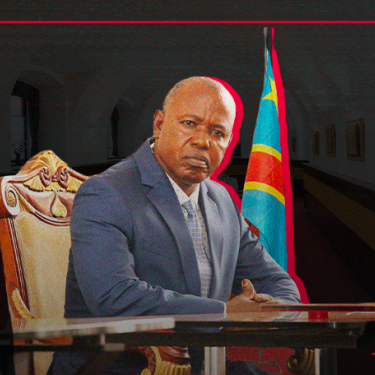Authorities in northwest DRC urged to safeguard press freedom after attacks on journalists

Reporters Without Borders (RSF) calls on the authorities in Équateur province, in the northwestern Democratic Republic of Congo (DRC), to pursue the dialogue initiated with the media after a series of press freedom violations and attacks on journalists, and to allow media personnel to work freely without fear of reprisals.
The dialogue began on 17 February, when Équateur governor Bobo Boloko Bolumbu invited journalists to his home in the provincial capital Mbandaka with the aim of reconciling after Mbandaka’s journalists decided on 13 February to stop covering the governor’s activities in reprisal for the major press freedom violation in the preceding days.
As local journalists were demonstrating in defence of press freedom in Mbandaka on 13 February, 21 of them were arrested by members of the National Intelligence Agency (ANR) and were held arbitrarily at the ANR’s local headquarters for several hours before being released.
They had been demonstrating above all in support of Mimi Etaka, the provincial director of the national radio and TV broadcast RTNC, who had been the victim of a physical attack on Governor Bolumbu’s orders eight days earlier.
On 5 February, Bolumbu forced his way into RTNC’s local headquarters accompanied by bodyguards, whom he ordered to beat Etaka for refusing to broadcast three of his decrees appointing new members to his provincial government. Etaka had nonetheless agreed to broadcast the decrees after the news show earlier in the day, albeit without interrupting the show as requested. Despite her attempts to defend herself, the bodyguards tore her clothes off and ransacked RTNC’s premises.
When contacted by RSF, Governor Bolumbu said Etaka “was not attacked” and the images showing her on the ground were “staged” by his political opponents. “If I was there, where are the images? There aren’t any showing the presence of soldiers, no photo, nothing.”
The governor nonetheless went to the RTNC offices in Mbandaka on 20 February to apologise. Etaka has meanwhile filed a complaint.
After the meeting with the governor on 17 February, the journalists present lifted their boycott of his activities. And other local journalists held a meeting on 21 February in order to end their boycott.
The dialogue initiated by the governor of Équateur province is a first positive signal. Firm undertakings must now be given to respect press freedom in order to ensure that media professionals are free to work without fear of reprisals or interference. The recent attacks against journalists are unacceptable and must not be repeated. The authorities must give a solid undertaking to end all forms of harassment of media professionals.
Wanted for criticising
This is far from being Bolumbu’s first press freedom violation. Steve Mwanyo Iwewe, the director of Radio Télévision Sarah (RTS), a provincial radio station, has been in hiding since 29 January, when Bolumbu ordered the ARN to arrest him.
Iwewe’s offence was to have hosted a broadcast on 27 January in which guests criticised the interior minister’s decision to restore Bolumbu to the governorship following his suspension on 11 January over election fraud allegations. Gunmen tried to break into Iwewe’s house on the night of 16 February, smashing its gate and firing shots in the air before leaving.
Bolumbu had ordered RTS’s closure in November 2021 but a court of appeal finally declared the closure illegal. In June 2023, when RTS had just been authorised to resume broadcasting after being off the air for 19 months, the provincial justice minister went with police officers to the radio station's premises on the governor’s orders and prevented its journalists from going back to work by denying them entry. RSF condemned this intervention as illegal at the time. Thanks to RSF’s support, RTS was finally able to resume broadcasting last November.
